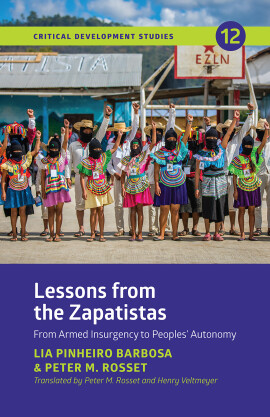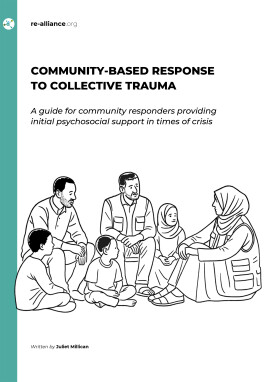
Lessons from the Zapatistas
From Armed Insurgency to People’s Autonomy
Lia Pinheiro Barbosa, Peter M Rosset, Henry Veltmeyer
Lessons from the Zapatistas is essential reading for anyone interested in liberation, democracy and radical social transformation. It tells the story of the Zapatista insurgency and its afterlives, tracing how an Indigenous uprising burst forth from southern Mexico’s Lacandon Jungle to stage the 21st century’s first and most electrifying example of autonomy in action. The book provides a succinct history of the Zapatistas while analyzing their unique political thought as an amalgam of influences from Mayan cosmovision and languages, the Mexican Revolution, Latin American revolutionary thought, Marxism and anarchism. The authors trace the movement from its clandestine origins to the 1994 uprising and failed negotiations with the Mexican government, through the development of their unique form of grassroots autonomy and self-government — all the while fending off the violence of the state. The book offers an original analysis of Zapatista political theory, attending to the prominent role of women, their practice of social autonomy and experiments in education, self-government and alternative economic development.
Series: Critical Development Studies
Published: 2025
Pages: 124
eBook: 9781788534383
Paperback: 9781788534352
| Introduction to the English Edition | |||
|---|---|---|---|
| En Movimiento [In Movement] Series of Small Books from CLACSO | |||
| Declaration of the Lacandon Jungle; Historical Background of Zapatismo | |||
| From Negotiation with the State to Radical Autonomy | |||
| Zapatista Autonomy | |||
| Without Women There Is No Revolution! | |||
| Autonomy in the Construction of a Different World | |||
| Zapatista Critical Theory | |||
| Radical, Popular, Peoples’ | |||
| Communitarian and Class Autonomy | |||
| Postscript to the English Language Edition | |||
| Bibliography |
'Three decades after the 1994 Zapatista uprising, their autonomy project continues to inspire grassroots movements around the world. While public attention has waxed and waned, this insightful analysis focuses attention on the innovative underlying elements of the movement, including its demand for a radical political, economic and cultural autonomy; its emancipatory, horizontal and participatory praxis; and its roots in community-based agrarian radicalism at the intersection of peasant class and Indigenous ethnicity. Barbosa and Rosset offer valuable reflections on autonomy as a key mode of resistance against the state and neoliberal capitalism. Their distillation of lessons from the Zapatista experience is essential reading for scholars and activists of transformative social movements.' Richard Stahler-Sholk, emeritus professor, Eastern Michigan University
'This book is a must read for social justice activists searching for transformative political roadmaps at the margins of the state. In these pages, Lia Pinheiro Barbosa and Peter Rosset critically reflect on radical autonomy — a powerful contribution of more than three decades of struggle in the Zapatista indigenous Mayan territories of Chiapas — as an alternative pathway for communities of people across diverse geographies with the potential to respond to the social and environmental crises of the world today.' Mariana Mora, professor, Centre for Research and Education on Social Anthropology (CIESAS), Mexico
'As states invariably fail our planet and the peoples who fight for her, Lessons from the Zapatistas is an essential primer for a path less traveled. With three decades of resistance, reflection and the construction of their own autonomy, the Zapatista journey continues to illuminate that path in the struggle for life for the coexistence of many worlds.' Kate Keller, US Coordinator, Schools for Chiapas
'This book explores the most important elements and contributions of this historic movement, highlighting transformations in its trajectory, the processes it has fostered and the contribution of its thought to critical theory and to the study of social movements. It also examines Zapatista praxis, a real example of building autonomy, which is also present in other social movements.' Maíra Araújo Cândida, RURIS journal, Brazil
Lia Pinheiro Barbosa
Lia Pinheiro Barbosa is a professor of sociology and an activist based in Fortaleza, Brazil. She has written extensively on the Zapatistas in Mexico and the MST (Landless Workers Movement) in Brazil.
Peter M Rosset
Peter M. Rosset is an academic, author and activist who resides in Chiapas, Mexico. He is a university professor in Mexico, Brazil and Thailand.
Henry Veltmeyer
Dr. Veltmeyer lived and worked for six years in South America before coming to Canada to pursue a doctoral program in political science and subsequently (in 1976) to begin his academic career in the Sociology Department at St. Mary’s University.
Kok Edoi: Emblematic Case of Peasant Autonomy and Re-Peasantization in the Struggle for Land in Thailand
Wisartsakul, Weeraboon
Rosset, Peter Michael
Barbosa, Lia Pinheiro
Suwan-Umpa, Sumana
Land, Vol. 14 (2025), Iss. 9 P.1726
https://doi.org/10.3390/land14091726 [Citations: 1]Collective empowerment in Latin America: Indigenous peasant movements and political transformation
Rosset, Peter
Phanthuwongpakdee, Nuttavikhom
(2025) P.1
https://doi.org/10.1080/03066150.2025.2559779 [Citations: 0]




